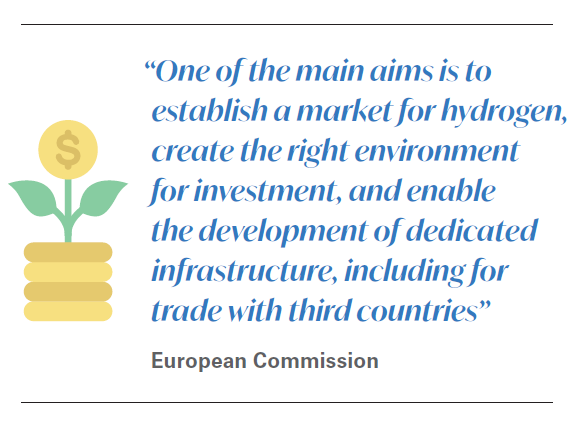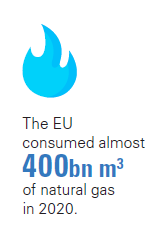European gas market reforms draw mixed reactions [Gas in Transition]
The European Commission published a series of legislative and regulatory proposals on December 15 aimed at decarbonising its natural gas market. Those proposals, which represent a compromise between political ambitions and economic and technical realities, have been met with mixed reactions.
Introducing lower-carbon gases
The EU executive proposed both regulation and a revised directive designed to accelerate the shift from natural gas to lower-carbon gases like hydrogen and bio-methane.
"One of the main aims is to establish a market for hydrogen, create the right environment for investment, and enable the development of dedicated infrastructure, including for trade with third countries," the commission said in a statement.
The market rules will be introduced in two phases before and after 2030, and will cover access to hydrogen infrastructure, the separation of hydrogen production and transport activities, and the setting of tariffs for low-carbon gases. A new governing structure known as the European Network of Network Operators for Hydrogen (ENNOH) will also be set up to promote dedicated hydrogen infrastructure, cross-border coordination and interconnector network construction. That body will also elaborate on specific technical rules.
The proposal envisages that national network plans will be based on a joint scenario for the electricity, gas and hydrogen markets, aligned with bloc climate targets. Gas network operators will have to report information on the infrastructure that can be decommissioned or repurposed, and there will be separate reporting for hydrogen to ensure that the network for the fuel is developed based on a realistic forecast for demand.
The commission said its new rules would make it easier for renewable and low-carbon gases to enter the existing grid, by scrapping tariffs for cross-border interconnections and reducing tariffs at injection points. A certification system for renewable gases will also be established, and the full greenhouse footprint of all gases will be considered to ensure a level playing field.
Notably, the commission said that no long-term contracts for unabated gas supplies should be extended beyond 2049, to avoid "locking Europe in" with the fuel for too long. It also said it would seek to replicate provisions in the electricity market that allow consumers to switch suppliers and get accurate pricing information more easily. This, it said, would facilitate consumers switching from natural gas to renewable and low-carbon gases.
Taking aim at methane emissions
As anticipated, the EU has published a separate proposal to reduce methane emissions from the energy sector. Agriculture is a bigger source of anthropogenic methane emissions, but the EU has so far concentrated its efforts on the energy industry as this is where it says the biggest reductions can be made at a relatively low cost. The commission wants to introduce strict rules for detecting and repairing methane leaks and introduce databases and monitoring tools to accurately quantify the emissions associated with imports of oil, gas and coal into the EU.
The proposal would also create a new EU legal framework to "ensure the highest standard of measurement, reporting, and verification (MRV) of methane emissions," the commission said. This would mean companies would have to measure and quantify their asset-level methane emissions at the source and carry out comprehensive surveys to find and repair leaks. It also wants to ban venting and flaring, and calls for member states to have plans to mitigate methane emissions from abandoned production sites.
The commission will tackle methane emissions from imported oil, gas and coal in two phases. First, importers will have to submit information about how their suppliers quantify their emissions. It will also use a transparency database and global monitoring tools, namely satellites, to show how different countries and energy companies perform in curbing their methane emissions.
Under the second phase, the commission will look to introduce more stringent measures on methane emissions associated with imported energy by 2025, after holding diplomatic talks with key energy partners. In the gas sector, these partners will include Russia and Norway, the bloc's two biggest gas suppliers, as well as key LNG exporters such as Qatar and the US.
The commission’s proposals are of course only the beginning. Before becoming law, they will be subject to lengthy negotiations by EU member states and the European Parliament. During that process they could undergo significant change.
NGO reactions
Environmental non-governmental organisations (NGOs) were largely unimpressed with the proposals.
The Environmental Defense Fund said the legislative proposal on methane emissions “shows promise but lacks ambitions on imports.”
“Imports make up 85% of European gas consumption, but most methane pollution from these sources occurs before the gas enters the EU. Yet under this proposal, these methane emissions remain unregulated. We have health and environmental rules for other imports, so why not natural gas?,” EDF Europe’s director Jill Duggan commented. “Cutting methane pollution is our best, fastest opportunity to slow the rate of warming now, while we move to decarbonise the economy. Unfortunately, the new EU plan fails to seize the moment.”
Duggan said it would be up to the European parliament and council to address this shortfall.
Global Witness meanwhile warned that the reform proposals for the gas market “would create lock-ins for fossil gas, leaving European households on the hook for costly, unjustified grid investments and reliant on the expensive, polluting gas.”
The NGO warned that the proposals would allow for more investment in the natural gas grid and promoted greater self-regulation in the industry.
“Instead of putting the needs of people first and showing a bold vision of a transition to affordable, renewable heating for all, the commission has announced a masterclass in greenwashing,” Global Witness’ senior gas campaigner Tara Connolly said. “It has left consumers at the mercy of greedy gas companies, determined to keep investing in expensive gas grids we no longer need. Citizens and communities would be left carrying not only the cost of these pipes but also the cost to their health, the climate and their pockets through fossil gas.”
Industry responses
The response from the natural gas industry has been broadly positive, with some caveats. The key takeaways from industry associations was that the legislation and regulation should be technology-inclusive and recognise the value of natural gas as a transition fuel. Rules on tackling methane emissions should not be too prescriptive.
GasNaturally, consisting of eight associations representing the entire European gas value chain, said it welcomed the proposed reforms.
 “The review of the EU gas market system presents a clear opportunity to bring huge benefits to the whole energy system,” GasNaturally president Dawn Summers commented. “Low-carbon hydrogen and other low-carbon and renewable gases offer viable solutions for a net-zero economy and provide flexibility during the transition, leveraging the existing, well developed energy infrastructure.”
“The review of the EU gas market system presents a clear opportunity to bring huge benefits to the whole energy system,” GasNaturally president Dawn Summers commented. “Low-carbon hydrogen and other low-carbon and renewable gases offer viable solutions for a net-zero economy and provide flexibility during the transition, leveraging the existing, well developed energy infrastructure.”
GasNaturally called on policymakers to seize the opportunities that hydrogen and other low-carbon gases offered, and “make full use of all gaseous solutions to reach climate neutrality by 2050.”
On the methane emissions proposal, Summers said the association welcomed “incentives to promote innovation and new technologies and practices in tackling methane emissions across the European gas supply chain.”
“We must be careful not to lose sight of the few relevant emission sources and avoid being overly prescriptive in policy instruments; new technologies and practices have the potential to further increase the cost-effectiveness of methane reductions over time; it’s important to retain that flexibility.”
The International Association of Oil & Gas Producers (IOGP) shared similar sentiments. It said the proposed reforms and plans for carbon management “can equip the EU with a powerful set of solutions to reach climate neutrality.”
“IOGP Europe calls on co-legislators to choose an ambitious, technology-inclusive, and affordable pathway to climate neutrality by using natural gas as a transitional fuel and further incentivising and accelerating the large-scale deployment of low-carbon hydrogen and carbon management solutions such as CCUS,” the body said.
IOGP said it saw gas technologies as the second pillar of the energy transition and praised the commission for looking beyond electrification as a solution for decarbonising energy.
“We still believe a stronger push on low-carbon hydrogen deployment is needed to fully exploit its potential,” IOGP’s regional director for Europe, Francois-Regis Mouton, commented. “2030 is practically today and 2050 is around the corner. We can no longer afford to be picky with technology deployment. If the EU is really serious about climate neutrality, we need to make the best use of natural gas as a transition fuel and incentivise the production of all-carbon hydrogen production methods right now. It’s in the co-legislators’ hands now.”
The International Gas Union commented that there was a lot it could support in both the methane emissions regulation and the decarbonised gas market package proposed by the commission. But on the methane rules, it cautioned that “any regulation that can be assessed as overly prescriptive, non-functional and not risk-based, especially in such a technical industry, is poor regulation.”
“We call for further dialogue to ensure an optimal outcome; achieving impactful reductions in gas sector methane emissions and maintaining a secure, well-functioning energy market,” the IGU said.



